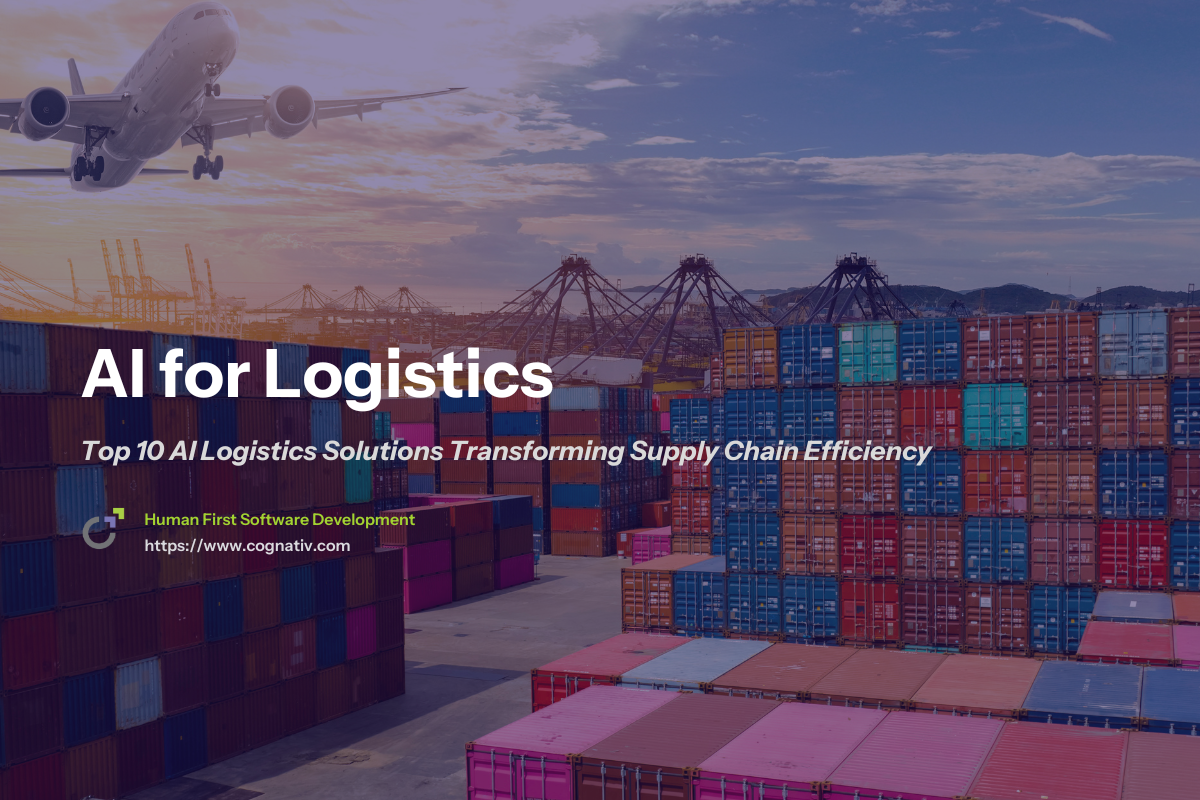

Monday, October 20, 2025
Kevin Anderson
Top 10 AI Logistics Solutions Transforming Supply Chain Efficiency
The logistics industry is at the center of one of the most significant operational transformations in decades. Artificial intelligence is no longer an experimental technology—it has become a strategic engine for improving supply chain management, optimizing logistics operations, and driving operational efficiency at scale.
As logistics companies face increasing pressure to reduce costs, meet customer expectations, and build more resilient supply chains, AI models and machine learning algorithms are emerging as essential tools. These technologies enable predictive demand forecasting, route optimization, intelligent warehouse management, and real-time decision-making.
For logistics managers, the question is no longer whether to adopt AI—but how strategically and at what scale.

Strategic Benefits of AI in Logistics
AI-powered logistics solutions offer measurable, bottom-line impact. By embedding AI systems directly into supply chain operations, logistics firms can unlock gains across planning, execution, and service delivery.
1. Cost Reduction and Efficiency Gains
AI tools analyze real-time traffic data and transportation routes to determine the most efficient routes for delivery, minimizing fuel consumption and transportation costs.
AI reduces manual data entry and human error, automating routine planning and reporting tasks.
2. Smarter Inventory Management
AI algorithms help optimize inventory levels, reduce excess inventory, and align stock availability with customer demand.
Predictive analytics based on historical sales data and market trends enables better forecasting.
3. Improved Customer Experience
By automating basic customer inquiries, AI-powered systems provide faster, more accurate responses.
End-to-end visibility in supply chain planning helps logistics companies meet customer demand with fewer disruptions.
The result is a supply chain that’s leaner, faster, and more responsive to change.

Leveraging AI in Logistics Operations
Leveraging AI strategically requires integrating intelligence at each operational layer—from planning and routing to fulfillment and after-sales support.
Demand Forecasting: AI models combine historical data and real-time signals to predict future demand more accurately.
Delivery Route Optimization: AI-powered logistics systems identify the most efficient route in real time, factoring in traffic conditions, capacity constraints, and cost variables.
Data Management: Automated data processing improves the accuracy of logistics planning and reduces operational delays.
Customer Service Automation: AI chatbots handle routine queries, allowing logistics teams to focus on complex issues.
This layered approach allows logistics companies to increase operational efficiency while maintaining a strong focus on customer satisfaction.

AI-Powered Solutions in Modern Logistics
The logistics sector is increasingly defined by intelligent, AI-powered solutions that address the full spectrum of supply chain challenges. These solutions don’t just automate processes—they provide predictive insight that allows for proactive decision-making.
Warehouse Management
AI-powered warehouse management systems enhance inventory control and enable adaptive slotting strategies.
Machine learning algorithms can detect inefficiencies and optimize picking and packing processes.
Transportation and Route Optimization
AI analyzes real-time traffic and delivery data points to determine efficient routes, minimize transit delays, and reduce transportation costs.
Predictive maintenance models help avoid unexpected fleet downtime.
Supply Chain Planning
By analyzing market trends, AI enables dynamic supply chain planning, supporting just-in-time delivery models and more accurate capacity forecasting.
Modern logistics firms are using these tools to stay ahead of disruptions and maintain continuity in volatile environments.

Generative AI in Logistics: A New Frontier
Beyond classical machine learning, generative AI is unlocking new opportunities for logistics companies.
Scenario modeling: Generative models simulate different supply chain scenarios—predicting bottlenecks, disruptions, or surges in demand.
Dynamic pricing: Real-time pricing optimization based on transportation costs, demand signals, and capacity constraints.
Automated response planning: Generative AI can create alternative delivery route strategies within seconds, helping firms stay ahead of sudden market shifts.
For logistics firms, this means moving from reactive problem-solving to proactive supply chain strategy.

Data Security in AI-Powered Logistics
As logistics companies adopt AI systems at scale, data security becomes critical. These systems process sensitive customer data, transaction information, and operational metrics.
Key considerations include:
Encryption and secure infrastructure to protect data integrity.
Regulatory compliance with frameworks like GDPR for cross-border operations.
Clear protocols to prevent data extraction or misuse of operational insights.
Building robust data security into AI-powered logistics not only protects the business but also builds trust with customers and partners.

Implementing AI Strategically in the Logistics Sector
Successful AI adoption requires more than buying software—it demands a strategic implementation plan aligned with operational goals.
Steps to implement AI in logistics effectively:
Identify pain points in supply chain operations and define clear ROI metrics.
Integrate AI with existing systems and workflows for seamless execution.
Invest in staff training and change management to enable adoption at scale.
Monitor model performance and fine-tune AI algorithms as operational conditions evolve.
Ensure compliance and security frameworks are established early.
By taking a deliberate approach to implementing AI technology, logistics companies can minimize risks while maximizing the value of intelligent automation.

AI for Logistics: Building Resilience and Competitive Advantage
AI is giving logistics firms the ability to build resilient supply chains, capable of adapting quickly to disruptions—from sudden demand spikes to geopolitical instability.
Predictive analytics enables agile response to supply chain challenges.
Generative AI creates flexible routing and planning strategies.
Automation improves cost control and operational speed.
Advanced forecasting allows firms to meet customer expectations reliably.
This shift is not just technological—it’s strategic. Logistics companies that implement AI early and intelligently will lead the next phase of logistics modernization.

Conclusion: The Future of Logistics is Intelligent
AI for logistics is redefining what’s possible in supply chain operations. From warehouse optimization to demand forecasting, route efficiency, and real-time data security, AI technologies are driving operational efficiency, cost savings, and better customer satisfaction across the logistics sector.
As AI adoption accelerates, the logistics industry will move from linear, manual processes to self-learning digital systems capable of anticipating and adapting to change.
For logistics leaders, the path forward is clear: leverage AI to transform operations, build resilience, and secure long-term competitive advantage in a rapidly evolving global supply chain.

